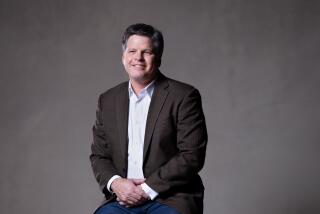Detour From the Dumpsters : Donations: Through a year-old routing program, tons of excess food that otherwise would be thrown out is given to more than a dozen charitable agencies by 20 Orange County restaurants and vending machine companies. But more help is needed.
Jack Moriarty is amazed, almost embarrassed, by the high quality of food he’s been able to serve lately to the 250 or so people who line up daily at the Someone Cares Kitchen.
“We’re getting soups, huge quantities of fresh lettuce and quiche. You should see these people eat it,” he said. “We’re getting nothing but top quality. The people on the line don’t realize it, but it’s like they’re going into restaurants and eating.”
In a sense, they are.
Through the year-old Prepared and Perishable Food Program, about 20 Orange County restaurants and vending machine companies are donating excess, unordered food to more than a dozen charitable agencies each month for their shelters or food lines.
In January, the program prevented 49,006 pounds of food from going to waste, said Kay Mather, administrator of the program for Food Distribution Center Serving Orange County. From May to December of last year, 155 tons were saved.
Soup line operators say the program has increased the variety of food they’re able to serve. Even the dozen or so vegetarians who eat at the Someone Cares Kitchen in Costa Mesa are kept happy with a vegetable soup that’s regularly donated, Moriarty said.
According to statistics compiled by the Food Distribution Center, 2.5 million pounds of food are wasted in Orange County every month. Of that, 1.7 million pounds are restaurant food. At the same time, Mather said, 380,000 people are at risk of being hungry at least a couple days each month.
The Food Distribution Center, which also operates a food bank in Orange, relies on private donations and grants. Kraft General Foods is the program’s largest ongoing cash donor, and also provides food to the Someone Cares Kitchen. There are about 110 similar programs across the United States.
After receiving an initial grant of $20,000 from the United Parcel Service Foundation early last year, Mather went to work hooking up donors with agencies. Among the key donating companies so far are Continental Vending Inc., Disneyland, the Hard Rock Cafe, Pizza Hut and Marriott Hotels.
“Our next goal is to increase the number of donors,” Mather says, adding that volunteers are needed to help find interested restaurants. “Having a kitchen is the ultimate goal of our program. There the food could be reprocessed, reheated to kill all bacteria and frozen. Then our agencies could get the food here.”
*
The program got a boost last year through a change in the state Good Samaritan laws, which helped free the donors from liability for spoiled food.
The Food Distribution Center is charged with ensuring that soup line workers know how to handle food and recognize spoilage, Mather said. Before an agency is certified to get food from a donor, she arranges for workers to take a daylong class in food handling from the Orange County Health Department.
The Food Distribution Center acts as a facilitator between the donors and food agencies, providing containers, certifying agencies, training and matching an agency’s needs to the food a restaurant can offer. The center receives reports from its agencies on the amount of food taken and checks the agencies regularly to ensure health guidelines are followed.
To increase the number of donors, Mather finds restaurants that give away food informally and tries to get them into the network. One of her current targets is Chicks Natural in Laguna Niguel, which regularly donates rice, potatoes and sometimes chicken for the Wednesday-night meal program at Calvary Chapel in Capistrano Beach.
*
The biggest donor is Continental Vending in Anaheim. The company, which removes unbought food from its machines before the expiration date, donated more than six tons of food in January, Mather said.
Vineyard Christian Fellowship in Anaheim, which feeds 800 to 1,200 people each Sunday, gets 40% of its food from Continental, according to Bobby Wright, who directs the program for the church.
Vineyard sends a truck to Continental every morning from Tuesday through Friday, and brings back between 700 and 1,600 pounds each trip.
“We never know what we’ll get: sandwiches, burritos, milk, yogurt, apples, cookies,” Wright said. “Once the food is here, we sort it; then we freeze the milk and Mexican dinners. We keep them till the weekend, then serve them to the poor. What we can’t freeze we give away.”
Management at Continental is only too happy to participate, said Bobby Yamada, project manager.
“If you can imagine a dumpster three-quarters full of food, that’s what we were throwing away just about every day before we started this,” he said. “We’d been wanting to do this type of thing for years, but the liability problems were insurmountable. The laws now shift the liability from us to the distribution people.”
At the Someone Cares Kitchen, whose clientele has increased almost 10% from a year ago, Moriarty constantly uses his Health Department training to check for unusable food. But lately, he says there’s been little need. The soup and lettuce he gets from the Hard Rock Cafe, and the clam chowder sent over from The Cannery, are “first rate.”
“These people in line, they can’t afford to get sick. They can’t afford a doctor,” he said. “So, if I wouldn’t eat it, I won’t serve it. But we’ve been so lucky. . . . We get food that people pay top dollar for.
“This is unbelievable, the quantity of lettuce, and how crisp it is. I’m almost suspicious that they cut it up just for us.”
More to Read
Sign up for Essential California
The most important California stories and recommendations in your inbox every morning.
You may occasionally receive promotional content from the Los Angeles Times.









